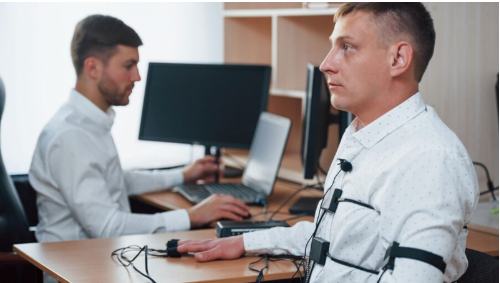Polygraph examinations have historically been regarded as a foolproof method of discerning deception, particularly in the criminal justice system. However, emerging reports suggest that lie detector tests aren’t entirely flawless.
Cases abound of convicted felons who aced polygraph tests and nearly escaped justice until detectives confronted them with more incriminating evidence, such as DNA prints. Similarly, multiple offenders have passed lie detector tests while on parole, only to end up committing even more heinous crimes during their probationary period.
The mixed results emanating from polygraph examinations continue to cast aspersions on the credibility of lie detector tests. According to critics, these evaluations are unreliable at best.
But are polygraph tests accurate? And if yes, to what extent?
This blog shall hopefully put those questions to rest.

How Accurate Are Polygraph Tests?
Most independent studies peg the accuracy of polygraph exams at 70% – 95%, depending on the type of exam administered. However, when your life or reputation is at stake, as is often the case during lie detector evaluations, even a 1% chance of false positives is highly undesirable.
Besides, polygraph examinations are subjected to widespread skepticism, with many critics considering that these evaluations lack solid scientific backing. While opposition to polygraph exams is often clouded by unfounded hostility towards these tests, it only casts more aspersions on their credibility.
The reality is that you can conduct a professional lie detector test that delivers near-100% accuracy or do a shoddy job with highly questionable results. Usually, the difference comes down to two aspects – approach and methodology.
Separating Fact from Fiction
Since the accuracy of polygraph exams is always a subject of intense debate, familiarizing yourself with common polygraph facts and fiction might help predict the outcome of these tests.
One critical polygraph fact is that they measure changes in an examinee Sympathetic Nervous System (SNS). The SNS tracks physiological reactions to various stimuli, including perceptions and the environment.
It’s also worth noting that a polygraph exam doesn’t uncover deception outright. Rather, it analyzes variations in the SNS responses to determine the probability that the examinee is being deceptive.
But even with robust checks and balances, polygraph exams may still result in false positives or false negatives. Reasons can range from a lack of understanding of the test subject to uncertainty in the examinee’s responses, poorly designed polygraph questions, and attempts by the defendant to use countermeasures.

Factors That Make Polygraph Tests Reliable
1. Reliance on Physiological Responses
Despite common misconceptions, polygraph exams are remarkably difficult to manipulate. That’s because the tests rely primarily on fluctuations in physiological responses, including heart rate, blood pressure, breathing patterns, and skin conductivity.
Physiological responses are naturally occurring, making them difficult to manipulate. Lie detector examiners use these reactions to reliably detect signs of deception.
2. Multi-pronged Approach to Result Interpretation
A subtle shift in heart rate may not offer reliable clues into a polygraph examinee’s credibility. To further improve the accuracy of lie detector tests, examiners must consider several factors while interpreting the test results.
First, there must be considerable shifts in the detected physiological responses against a predefined baseline.
Besides, it’s best to check anomalies across several physiological responses. Fluctuations in multiple aspects of body physiology may strongly indicate deception, even if the changes are only mild.
3. Professional Administration
Polygraph evaluations are often conducted by professionals, leaving little room for doubt and error. Ideally, it’s recommended to have all lie detector tests administered by an accredited polygraph examiner.
Professional polygraph examiners possess the technical and soft skills required to conduct proper lie-detection tests. They understand how to operate polygraph machines, what constitutes the ideal testing location, and how to interpret physiological responses.
Besides, accredited lie detector examiners are excellent communicators who can clearly articulate every requirement to the defendants, including provisions of the Fifth Amendment. Note that polygraph examinees must wholly submit to a lie detector test for the results to be legally binding. But even so, they do not give up their Fifth Amendment rights.

What Could Falsify Polygraph Results?
1. Pathological/Pharmacological Impairment
Sickness or medication can impair a polygraph examinee’s ability to understand the significance of each question asked during lie detector tests. Failure to understand the logic behind a polygraph question could elicit improper response, resulting in a false positive.
Therefore, a polygraph examinee must disclose their medical condition ahead of each lie detector test. This allows the examiner to determine whether to proceed with or postpone the test.
2. Incompetent Examiners
We cannot overemphasize the significance of having all lie detector tests undertaken by a qualified polygraph examiner. Working with a professional helps to avert mistakes before, during, and after the test.
A skilled polygraph examiner should prepare adequately for a lie detector test and administer the exam following the protocols. They should then interpret the results analytically to avoid false positives or false negatives.
3. Use of Countermeasures
Countermeasures are strategies deployed by defendants, ostensibly to ace lie detector tests. For instance, an examinee may take antidepressants to remain calm during lie detector tests.
The use of countermeasures by some lie detector examinees underscores the significance of working with professional polygraphers. A skilled polygraph examiner can detect countermeasures and deploy ingenious strategies to mitigate them.

Acing Polygraph Tests Like a Pro
Polygraph exams continue to attract mixed reactions from dismissive critics and enthusiastic proponents alike. However, while certain predispositions could diminish the accuracy of lie detector tests, you can take several measures to conduct credible polygraph evaluations.
At the minimum, plan adequately before administering a polygraph examination. That entails selecting the best testing location and proper equipment setting and preparing the examinee psychologically.
Besides, all responses should be interpreted against predefined physiological baselines. Remember to reference the examinee’s criminal profile and medical history while analyzing lie detector results.






